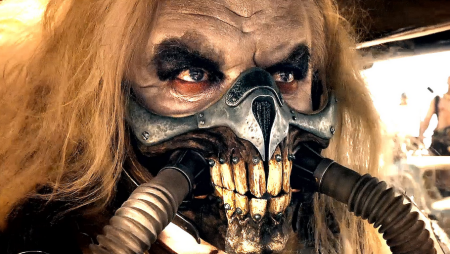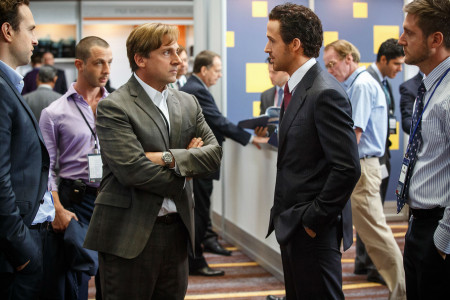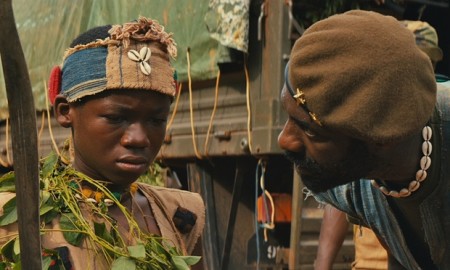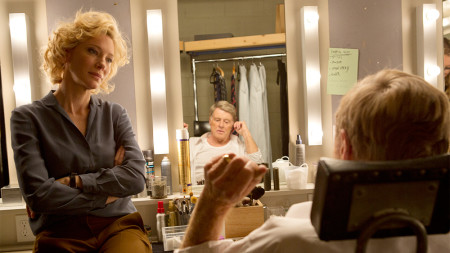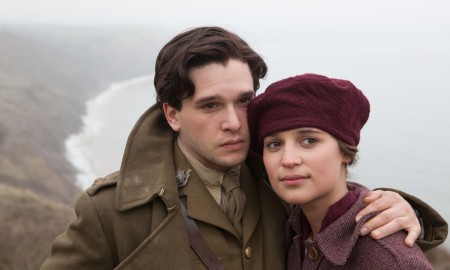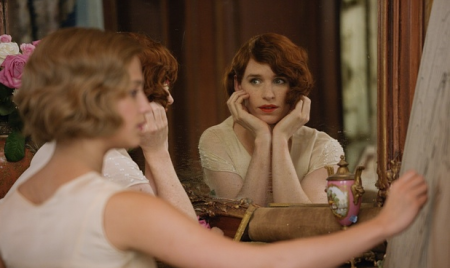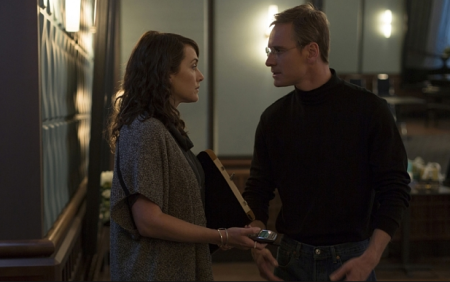1. Brooklyn – John Crowley’s magnificent Brooklyn is a study in contrasts, between small Irish towns and big American cities, nationals and immigrants, naiveté and womanhood, former homes and new horizons, an Italian-American love and an Irish suitor. It’s also one of the best movies ever made about coming of age and identity, and Saoirse Ronan’s fully-felt, heartbreaking performance as a young Irish immigrant in Brooklyn circa 1950s is as pure a thing of beauty as the movies has seen in perhaps an age. In an ensemble that includes the great Julie Walters and Jim Broadbent, young star Emory Cohen steals the show as the simple plumber who falls for Ronan’s headstrong foreigner. Their courtship is moving in its young stars’ vulnerable displays of humor, romance and pathos. A simple yet profound tale of finding a place in the world and learning to love and be loved, it’s often said they no longer make movies like Brooklyn. This time, they did.
2. The Revenant – At once a sprawling spectacle of the American frontier and an intimate story of man against nature—and man against the nature of man—Alejandro Gonzalez Inarritu’s revelatory adventure The Revenant found a dogged Leonard DiCaprio fighting for his life in the Western wilderness of the 1820s, shot by DP Emanuel Lubezki—who delivers this film—in natural light and featuring some of the closest-to-the-Earth survival scenes ever put on film. After a savage bear attack leaves him half-dead then betrayed by rival Tom Hardy, DiCaprio rises from a shallow grave to feast on raw animal meat, sleep in bloody carcasses, bob about in frigid rivers, commune with unforgiving nature and bond with kindred Native Americans. As a portrait of endurance and rebirth, The Revenant is mystical, poetic, majestic and brings us as viscerally close to death as a movie can, right to its final, wall-breaking shot. For star DiCaprio, it was an unmitigated triumph.
3. Carol – Todd Haynes’ highly-toned jewel, Carol, was the year’s best love story, but it was far more—an examination of post-war mores and the consequences of repressed identities in a conservative time and place, a delicate awakening between two women, opposites, who had the courage to live their truths; a rapturous aural and visual poem courtesy of DP Ed Lachman and composer Carter Burwell; a vividly etched portrait of a seemingly perfect wife and mother eroding beneath her impeccable coif and couture. As the titular, 1952 New Jersey trophy wife in an identity crisis, then in love after meeting a much junior paramour played by Rooney Mara, Cate Blanchett’s synergy with Haynes created one of the most memorable, sad and richly detailed characters of the year.
4. Mad Max: Fury Road – A blazing vision of artistic genius, Mad Max: Fury Road was the most imaginatively conceived and executed movie this year, and perhaps—let’s just say it—the best action movie ever made. Seventy-year-old writer-director George Miller, firing on all cylinders, took what might have been a B-movie premise—a band of women lead a rebellion against a sexist dictator in the post-apocalypse—and fashioned a jaw-dropping, inventively choreographed and maniacally exciting movie-movie, starring Charlize Theron and Tom Hardy as renegades pursued by a sadistic overlord hording their water supply and enslaving the village women. Feral Theron leads the charge while Hardy’s Max Rockatansky takes a welcome backseat in this pointed feminist allegory. Miller, largely eschewing digital effects for the love of stunts and the chase, fetishizes the minutiae of vehicles and velocities to create a “how did he do that?” frenzy of mayhem and inspiration.
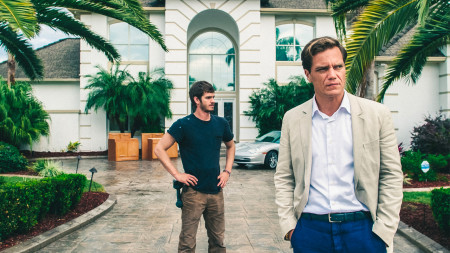
5. 99 Homes – The only social realist working today in American movies, filmmaker Ramin Bahrani trains his focus on the issues of ordinary folks in crisis, and his 99 Homes was the year’s best suspense movie, a tensely wound morality play about a disenfranchised Florida construction worker (Andrew Garfield) who, after being evicted from his childhood home along with his mother (the always excellent Laura Dern), strikes a Mephistophelean bargain with his very exploiter, a corrupt real estate agent played with slick relish by Michael Shannon. Together they put what feels like most of South Florida’s families on the curb, humiliating friends and residents, defrauding government programs and making massive bank. But what of the moral cost? Timely and disturbing, such a perversion of the American Dream has never felt so piquant to watch. 99 Homes is an intense, hot button movie about the greed behind the housing crisis, and the dwindling luxury of values when selling souls net a higher price.
6. The Big Short – Like 99 Homes, Adam McKay’s The Big Short, an expansive and corrupt profiteering comedy-drama about the financial services maestros who tanked the American economy by laying the plans for the mortgage crisis and economic collapse of 2008, sits at the crossroads of dual bankruptices, both ethical and economic. Not that there is anything ethical on anyone’s minds here as a charismatic, boys’ club cabal have their fun manipulating an unstable housing market. Christian Bale is sensational as a hedge fund manager with a vision—bet against already unstable mortgages by way of credit default swaps, swindling banks into too-good-to-fail deals. Until they did. Investors (Ryan Gosling, John Magaro, Finn Wittrock), the nervous head of a trading firm (Steve Carrell) and a former banker (Brad Pitt) set up the deals, hedge their bets and…watch America fall like a house of cards. Pitt’s lone moral voice—who does his part in the schemes as well—is the only one concerned about the disaster to come. Dense, jargony and inside baseball as far as it goes, The Big Short is also a graduation for underestimated director McKay, who should immediately retire from helming crass Will Ferrell comedies. Like Margin Call, The Big Short benefits from the real-life consequences we bring to it, and McKay makes the complex financial maneuvers accessible by employing real-life, non-sequiturial asides, including Margot Robbie in the film’s funniest scene, who dispenses explanations before telling us to “fuck off”—just as the movie’s string-pullers did.
7. Beasts of No Nation – Cary Fukanaga’s searing anti-war polemic Beasts of No Nation is a true epic, a blistering tale of innocence lost set against the backdrop of civil war in an unnamed African nation. Young star Abraham Atta is Agu, a boy from a middle class, strong values family, left alone after a bloody militant uprising. Alone and terrified, he joins a guerilla battalion, transforming into a child soldier under the tutelage of the powerful Idris Elba’s commandant, a surrogate father whose charisma drives the militia and his own darker agendas. There’s much more to it than this rudimentary description, but a pointed monologue about the power of a young boy’s hands to become radicalized tools couldn’t be more timely, and Fukanaga, who spent seven years adapting the screenplay from the novel by Uzodinma Iweala, fashions a hothouse of bullets, blood, babes in battle and makeshift family factions that rise and fall. That Beasts of No Nation’s coda imagines a healing from such a gruesomely sobering milieu is deeply affecting, and its novice star’s ability to convey both an innocent child, kind of heart and a stone cold jungle killer, is provocative, to say the least. War is hell, Fukanaga shows us, but on the other side there might just be hope.
8. Truth – The most overlooked great picture this year, James Vanderbilt’s Truth, based on fired CBS producer and journalist Mary Mapes autobiographical Truth and Duty: The Press, The President and the Privilege of Power, was swiftboated by the CBS fact police much as Mapes and her team, including Dan Rather, were hung out to dry by the network in 2004 after broadcasting an election moment story about George W. Bush evading Vietnam and later going AWOL from the National Guard. The story was true, but no matter. Cate Blanchett, in a stunning performance ranking amongst the best ever given by an actor playing a journalist with ethics, passion and drive (and that includes this year’s glorified Spotlight) is Mapes, charging hard at the story. As veteran Rather, Robert Redford is her thought partner and idol, and onscreen the pair is simply engrossing. Taking down the president’s record during an election cycle is high takes stuff, and both actors commit to Truth with uncommon gravitas. Unlike procedural Spotlight, Truth heavy lifts the personal and professional consequences of having ethics in the face of corporate dollars and donors, and when the hammer comes down, Blanchett faces an investigatory committee in scenes bearing the weight of great tragedy, for both the woman and the freedom of the press. Jobs were lost, retirements forced and reputations smeared—and the story was still true. Stacy Keach delivered one of the year’s great supporting turns as the key witness who recanted in the 12th hour, and an on-camera confession of deception as the network attempts to save face, ranked amongst the year’s best scenes.
9. Testament of Youth – No one paid attention to James Kent’s Testament of Youth, a wartime romance and full-throated cry against the futility of battle featuring the new star of the year, Alicia Vikander, in a writ large performance as good as her work in this year’s Ex-Machina and The Danish Girl. Perhaps it went largely unnoticed because the World War I story of Vera Brittain—an independent thinker and one of the few women at Oxford—who walked away from university to become a nurse at the front when her brother, best friend and lover all enlisted, is a distinctly British chapter. Yet its themes couldn’t be more universal, and Testament of Youth is a major picture; one that takes you to unexpected places. Dying is everywhere once the war kicks in, and what Vera learns tending to “enemy” soldiers impacted her work, life and vantage point, an unpopular point of view in a final scene of power where Vikander makes a public plea for peace. Cinematographer Rob Hardy’s widescreen compositions present the battlefield as part Gone with the Wind, part fog of war, and Max Richter’s score is the stuff of classics.
10. The Danish Girl – In a quietly revolutionary way, Tom Hooper’s The Danish Girl, cloaked in an air what might be described as voluptuous tastefulness, is a radical, progressive picture. Starring a fascinating Eddie Redmayne as Lili Elbe, the first operative transsexual who underwent the highly risky surgery nearly a century ago, it is a movie about embracing identity at a time when such an identity was considered abhorrent by both society and the medical establishment. Such was not the case in the marriage between Redmayne’s celebrated Copenhagen painter and his bohemian, artist wife, beautifully played by Alicia Vikander, who came to understand the meaning of unconditional love and all it could accommodate as their marriage went from traditional to something completely different. Redmayne’s work here is entrancing, perhaps even more accomplished than his Oscar-winning performance in last year’s The Theory of Everything. With his porcelain skin, crane’s neck, lithe gait and measured cadences, his personification of a female doppelganger becomes a wholly original, libertarian, radical version of the self. Vikander all but matches him with an emotionally resourceful portrait of a woman as surprised by her husband’s transition as by her own ability to embrace it.
11. Steve Jobs – Unfairly maligned, Danny Boyle’s electrifying Steve Jobs failed to attract an audience after erroneous word of mouth suggested it featured an “unlikable” vision of our late, preeminent genius. Their loss. This crackling, challenging character study written by Aaron Sorkin gave Michael Fassbender (as Jobs) and Kate Winslet, as his long-suffering marketing executive, plumb roles in a picture structured around three failed product launches, board double crosses, flagging personal loyalties and a daughter who went unacknowledged for years. With performances (including a terrific Seth Rogen and even better Jeff Daniels) directed at a rapid clip, tense pacing and an actor who, warts and all, went for it, Steve Jobs deserved better than it got—poor box office that tanked its Oscar buzz. Great entrepreneur, lesser human being, fascinating movie.
12. Chi-Raq
13. Far from the Madding Crowd
14. Ex Machina
15. The Hateful Eight
16. Room
17. Suffragette
18. Son of Saul
19. Crimson Peak
20. Tangerine

